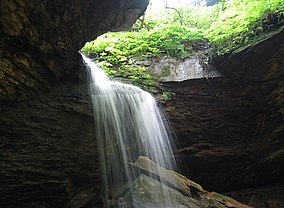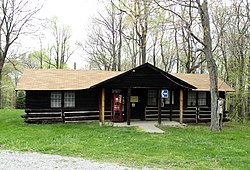Raccoon Creek State Park is a 7,572-acre (3,064 ha) Pennsylvania state park on Raccoon Creek in Hanover and Independence townships in Beaver County, Pennsylvania in the United States. The park is about 30 miles (48 km) from the city of Pittsburgh, near Hookstown. Raccoon Creek State Park is easily accessed from Pennsylvania Route 18 and U.S Routes 30 and 22. The park offers numerous activities such as hiking, biking, cross-country skiing, camping, hunting, swimming, fishing, and boating, the last three at the 101-acre (41 ha) "Raccoon Lake."
| Raccoon Creek State Park | |
|---|---|
 A waterfall at Raccoon Creek State Park | |
 | |
| Location | Beaver, Pennsylvania, United States |
| Area | 7,572 acres (30.64 km2)[1] |
| Elevation | 932 ft (284 m)[2] |
| Established | 1945[1] |
| Named for | Raccoon Creek |
| Visitors | 530,000[3] |
| Governing body | Pennsylvania Department of Conservation and Natural Resources |
| Website | Raccoon Creek State Park |
Raccoon Creek RDA | |
 One of the cabins in the RDA | |
| Location | Route 18 in Hanover Township |
| Coordinates | 40°30′42″N 80°26′34″W / 40.51167°N 80.44278°W |
| Area | 812 acres (329 ha) |
| Built | 1935 |
| Architect | CCC Camps SP-6 and SP-16 |
| Architectural style | National Park Service Rustic |
| MPS | Emergency Conservation Work (ECW) Architecture in Pennsylvania State Parks: 1933-1942, TR |
| NRHP reference No. | 87000745[4] |
| Added to NRHP | May 18, 1987 |
Raccoon Creek State Park was chosen by the Pennsylvania Department of Conservation and Natural Resources (DCNR) and its Bureau of Parks as one of "25 Must-See Pennsylvania State Parks".[5]
History
editHealth resort
editRaccoon Creek State Park is located on the site of a former Victorian era health resort. Frankfort Minerals Springs was the site of a natural mineral spring. It was founded by Edward McGinnis in the mid-19th century. He believed that the mineral spring waters held curative powers. McGinnis built his resort atop a hill in what is now Raccoon Creek State Park. Visitors to the resort walked down steps to the springs. The resort was very prosperous. At one time it featured a hotel, dance hall, livery stable and numerous guest cottages. Frankfort Mineral Springs closed during the first part of the 20th century.[6]
Recreational Demonstration Area
editAlong with two other Pennsylvania state parks, Raccoon Creek State Park was established as a Recreational Demonstration Area during the Great Depression. Its earliest buildings, constructed by the Civilian Conservation Corps in 1935, are split among four areas: three group camps and a headquarters/maintenance complex.[7]: 1, 2 Built in the National Park Service Rustic style,[7]: 16 these buildings were added to the National Register of Historic Places in 1987 as a historic district;[4] a total of 114 buildings and structures qualified as contributing properties.[4] The district was added to the Register for several significant reasons: besides their distinctive architecture and their role as parts of a recreational area, the buildings reflect the federal government's attempts to resolve the poverty of the Depression through political means.[7]: 16
Park
editRaccoon Creek State Park has continued to develop from its beginning in the 1930s to one of the largest state parks in Pennsylvania. Facilities at the park are a mix from the early camp to modern facilities. In addition to recreational areas, there are large tracts of undeveloped land.[8] Scenes for the film The Road were filmed at the park in the spring of 2008.[9]
Wildflower Reserve
editThe 314-acre Wildflower Reserve, located at the eastern section of Raccoon Creek State Park, contains one of the most diverse stands of wildflowers in western Pennsylvania. Over 700 species of plants have been identified in the Reserve .[10][11] Trails lead through a variety of habitats like oak-hickory forest, pine plantations, woodland meadows, and flood plain forest along Raccoon Creek. Wildflowers can be observed throughout the growing season with peak wildflower blooms occurring in late April and August. Because of its uniqueness and to preserve the many wildflower species, the Reserve is closed to all activities other than hiking on designated trails.
Environment
editRaccoon Creek State Park lies within the Appalachian mixed mesophytic forests ecoregion.[12]
Recreation
editThere are about 500 picnic tables spread among 5 picnic areas at Raccoon Creek State Park. Five pavilions are available to rent or if unrented are available on a first come, first served basis.[1]
Raccoon Lake is open for year-round fishing. The common game fish are bullhead catfish, bluegill, yellow perch, crappie, walleye, muskellunge, and both large and smallmouth bass. Raccoon Lake's feeder streams are stocked with brook and rainbow trout by the Pennsylvania Fish and Boat Commission. These fish can also be found in the lake.[1]
Hunting is permitted on over 5,000 acres (2,000 ha) of Raccoon Creek State Park. Hunters are expected to follow the rules and regulations of the Pennsylvania Game Commission. The common game species are ruffed grouse, squirrels, turkey, pheasants, white-tailed deer, and rabbits. The hunting of groundhogs is forbidden.[1]
Nearby state parks
editThe following state parks are within 30 miles (48 km) of Raccoon Creek State Park:[13][14][15]
- Beaver Creek State Park (Ohio)
- Guilford Lake State Park (Ohio)
- Hillman State Park (Washington County)
- Point State Park (Allegheny County)
- Tomlinson Run State Park (West Virginia)
References
edit- ^ a b c d e "Raccoon Creek State Park". Pennsylvania Department of Conservation and Natural Resources. Archived from the original on October 2, 2011. Retrieved November 28, 2006.
- ^ "Raccoon Creek State Park". Geographic Names Information System. United States Geological Survey. August 2, 1979. Retrieved December 22, 2007.
- ^ Hopey, Dan. "Cutbacks put some state parks on shaky ground". Pittsburgh Post-Gazette. Retrieved May 24, 2009.
- ^ a b c "National Register Information System". National Register of Historic Places. National Park Service. March 13, 2009.
- ^ "Find a Park: 25 Must-see Parks". Pennsylvania Department of Conservation and Natural Resources. Archived from the original on September 26, 2011. Retrieved May 26, 2015.
- ^ "State park, preserve resort once sought for curing powers". Pittsburgh Tribune Review. Retrieved June 20, 2008.
- ^ a b c Milner, John, Associates. National Register of Historic Places Inventory/Nomination: Raccoon Creek RDA. National Park Service, October 1986. Accessed 2009-12-17.
- ^ "Pennsylvania State Parks: The CCC Years". Pennsylvania Department of Conservation and Natural Resources. Archived from the original on February 5, 2004. Retrieved November 28, 2006.
- ^ Machosky, Michael (November 24, 2009). "Review: 'Road' doesn't do justice to McCarthy's novel". Pittsburgh Tribune-Review. Retrieved November 26, 2009.
- ^ Pennsylvania Department of Conservation and Natural Resources. 2010. "Wildflower Reserve Trail Map". Retrieved November 4, 2011.
{{cite web}}: CS1 maint: numeric names: authors list (link) - ^ Miller, Shane. 2006. "Past and Present: Vascular Plants of the Wildflower Reserve at Raccoon Creek State Park". Retrieved November 4, 2011.
{{cite web}}: CS1 maint: numeric names: authors list (link) - ^ Olson, D. M; E. Dinerstein; et al. (2001). "Terrestrial Ecoregions of the World: A New Map of Life on Earth". BioScience. 51 (11): 933–938. doi:10.1641/0006-3568(2001)051[0933:TEOTWA]2.0.CO;2.
- ^ "Find a Park by Region (interactive map)". Pennsylvania Department of Conservation and Natural Resources. Archived from the original on September 24, 2011. Retrieved November 18, 2011.
- ^ 2007 General Highway Map Beaver County Pennsylvania (PDF) (Map). 1:65,000. Pennsylvania Department of Transportation, Bureau of Planning and Research, Geographic Information Division. Archived from the original (PDF) on August 5, 2011. Retrieved July 27, 2007. Note: shows Raccoon Creek State Park
- ^ Michels, Chris (1997). "Latitude/Longitude Distance Calculation". Northern Arizona University. Retrieved April 23, 2008.
External links
edit- "Raccoon Creek State Park official map" (PDF). Archived from the original (PDF) on October 9, 2015. (1.22 MB)

